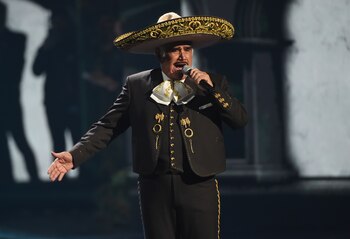
The controversy surrounding the new bioseries by Vicente Fernández, entitled The Last King, has not stopped. And on this occasion, one of the new chapters revived the controversial moment when Charro de Huentitán did not accept a liver transplant due to attitudes that were associated as homophobic.
And it was in May 2019, when the performer of songs such as Acá entre nos or Por tu cursed amor had an interview with Gustavo Adolfo Infante at the Los Tres Potrillos ranch and where he revealed that, when he was ill, he refused a transplant because he had not felt comfortable having another's organ man.
The actor also in films like The Mason delved into the fact that he would not have been able to sleep in his bed knowing that he had someone else's liver and “less not knowing if he was a homosexual or a drug addict”. This made the famous charro the target of criticism and there was a burst of memes where netizens mocked what his life would have been like if he had accepted the “gay liver”.

When asked Vicente, son of the singer if his relative was homophobic, he said “no way and he is very respectful. I want to make it clear to the public that the entire Fernández family, in my father's career and in what Alejandro and I managed to do, we make no distinction of any kind, we respect their sexual preferences, we make no difference.”
When this episode of his life was recently taken up in the series, Gustavo Adolfo Infante gave his point of view on it during the broadcast of the program De primermano.
“It would have been nice if Juan Osorio put the image of Imagen Televisión or mention who did it (the interview),” said the show host.
In this regard, Infante showed a fragment of the fiction and another from the original interview and remarked that at the time the negative comments were also against him because he was accused of changing the musician's statements.
“They wanted to scrub and then they said they edited it, but the interview was live,” he said.
Likewise, the First Hand drivers recalled that on that occasion, Gustavo Adolfo Infante was not sure that he would be able to interview Vicente Fernández, since in the first instance he came to talk to Christian.

“I never had a no by Vicente Fernández, with me it was always totally open,” Infante remarked and clarified that outside of fiction, the Mexican regional interpreter never tried to have his statements changed.
The legal conflict between Televisa and Doña Cuquita Abarca, Vicente Fernández's widow, seems to have no end, as the dynasty's legal efforts have been fruitless to prevent the broadcast of the series El Último Rey.
In a recent statement, the law firm in charge of defending the Fernández Dynasty, Del Toro Cazo, announced that things are going from strength to strength against Televisa.
So far, according to the defense, they have a cumulative of three suspensions by different amparo judges for the measures imposed by the Mexican Institute to take effect of Industrial Property (IMPI) against the company.
The previous ones order to immediately stop broadcasting the singer's “illegal bioseries”, in addition to the fact that the measures cannot be lifted by the institute.
KEEP READING
Últimas Noticias
Debanhi Escobar: they secured the motel where she was found lifeless in a cistern
Members of the Specialized Prosecutor's Office in Nuevo León secured the Nueva Castilla Motel as part of the investigations into the case

The oldest person in the world died at the age of 119
Kane Tanaka lived in Japan. She was born six months earlier than George Orwell, the same year that the Wright brothers first flew, and Marie Curie became the first woman to win a Nobel Prize

Macabre find in CDMX: they left a body bagged and tied in a taxi
The body was left in the back seats of the car. It was covered with black bags and tied with industrial tape
The eagles of America will face Manchester City in a duel of legends. Here are the details
The top Mexican football champion will play a match with Pep Guardiola's squad in the Lone Star Cup

Why is it good to bring dogs out to know the world when they are puppies
A so-called protection against the spread of diseases threatens the integral development of dogs



